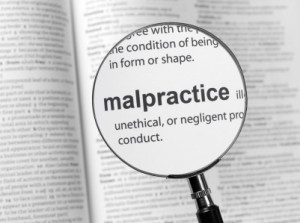 In some unfortunate circumstances, legal clients may fall victim to unethical, illegal, or negligent behavior on the part of their lawyers. This is referred to as legal malpractice. Clients who feel that they are victims of legal malpractice may wish to file an additional lawsuit against the accused lawyer. Legal malpractice can be difficult to prove in court, as it may often be difficult to gather a strong case to present to court. Clients who believe they were victims of legal malpractice should speak with an experienced and knowledgeable legal malpractice lawyer. Legal malpractice lawyers can help clients by providing advice, guidance, and assistance with the ongoing legal process.
In some unfortunate circumstances, legal clients may fall victim to unethical, illegal, or negligent behavior on the part of their lawyers. This is referred to as legal malpractice. Clients who feel that they are victims of legal malpractice may wish to file an additional lawsuit against the accused lawyer. Legal malpractice can be difficult to prove in court, as it may often be difficult to gather a strong case to present to court. Clients who believe they were victims of legal malpractice should speak with an experienced and knowledgeable legal malpractice lawyer. Legal malpractice lawyers can help clients by providing advice, guidance, and assistance with the ongoing legal process.
What Is Legal Malpractice?
Legal malpractice occurs when a lawyer commits negligence, breach of contract, or breach of fiduciary duty that causes harm to a client. It is important to note that there is a significant difference between legal malpractice and incompetence or poor strategy. Legal malpractice may be a deliberate effort to deceive clients, or negligence of the lawyer’s expected role as an attorney.
Legal Malpractice Case Elements
In order to prove that a lawyer committed legal malpractice, the client holds the burden of proof. This means that the client is responsible for providing sufficient legal evidence to support the claim that the lawyer committed legal malpractice. This requires proof that the lawyer was responsible for certain errors or actions that no reasonable attorney would make in a similar situation.
Proving Causation
One of the main elements of a legal malpractice lawsuit is proving causation. The plaintiff, or client filing the lawsuit against the attorney, must prove that his or her case would have turned out differently if the lawyer did not commit legal malpractice. In other words, the plaintiff must prove that the attorney caused negative repercussions by committing legal malpractice. This is often difficult to prove, as the process relies heavily on speculation. Additionally, this often requires a “trial-within-a-trial.” This means that the plaintiff will often need to discuss the original case for which the defending lawyer was hired in the first place.
Exoneration
In some cases, clients may wish to file a legal malpractice lawsuit because they were convicted of a crime they did not commit. In these cases, clients feel that their lawyers failed to fulfill their role and properly defend the client in court. This presents a unique issue in some jurisdictions. In these specific jurisdictions, those found guilty of a crime must first obtain exoneration from the court before they can file a legal malpractice lawsuit against the lawyer. This means that the client must petition the court to recognize that he or she was in fact innocent, and that the conviction was solely a result of the attorney’s negligence or malice.
Legal Malpractice Examples
Examples of legal malpractice may include the following:
- Failure of the attorney to know or properly apply an applicable law
- Errors in planning specific case details
- Inadequacy in the discovery and investigation process
- Failure to file necessary paperwork and documents within their deadlines
- Losing documents or files that played a critical role in the lawsuit
- Failure to obtain the client’s consent before moving forward with a strategy
- Fraud or deceit in representing his or her experience or qualifications
- Prosecuting an individual based on personal reasons, such as malice toward another
- Errors occurring during the record search process
- Committing libel or slander against another, which may hurt one’s reputation
- Violating the civil rights of another individual
- Delegating critical work to an employee or outsider who did not have adequate experience
Role of Legal Malpractice Lawyers
Legal malpractice lawyers will defend clients in a lawsuit against their prior lawsuit and attempt to prove that the defending lawyer committed legal malpractice. Legal malpractice lawyers will typically work to prove one of three main types of malpractice. These are negligence, breach of contract, and breach of fiduciary duty.
Legal malpractice may hold defending lawyers responsible for:
- Negligence: Failing to treat a client’s case in a manner that is reasonably expected of any attorney of similar skill and expertise in a similar scenario.
- Breach of contract: Failing to fulfill the elements of the contract that was signed by both parties when the client initially hired the attorney.
- Breach of fiduciary duty: When the lawyer acts in his or her own best interests, as opposed to the best interests of the client.
Sources:
Johnson, Vincent R. “The Unlawful Conduct Defense in Legal Malpractice.” UMKC Law Review 77.1 (2008): 43-83. Index to Legal Periodicals & Books Full Text (H.W. Wilson). Web. 2 Apr. 2014.
Lalli, Matthew L. “Avoiding Legal Malpractice Claims.” Utah Bar Journal 15.1 (2002): 8-10. Index to Legal Periodicals & Books Full Text (H.W. Wilson). Web. 2 Apr. 2014.
“Practitioners learn the ins and outs of legal malpractice.” Florida Bar News 15 Dec. 2013: 15. Academic OneFile. Web. 2 Apr. 2014.
Temkin, Barry R., and Robert J. Usinger. “Be careful whom you recommend: legal malpractice and outside referrals.” Young Lawyer Mar. 2013: 2. Academic OneFile. Web. 2 Apr. 2014.
